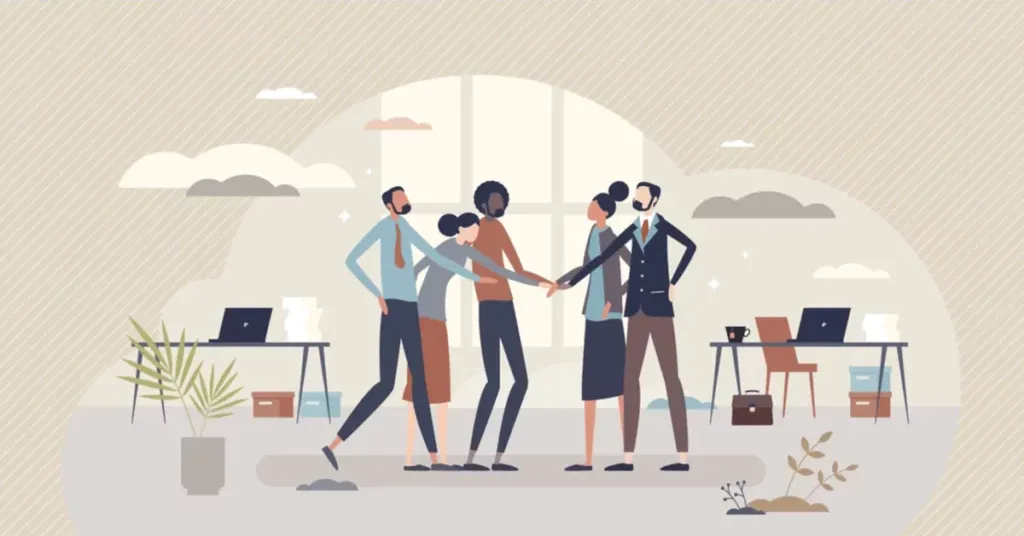Fostering strong camaraderie and collaboration within teams is more crucial than ever. It’s the backbone of a thriving workplace, where ideas flourish, productivity soars, and employee satisfaction remains high. This article dives into five practical tips that can significantly enhance team dynamics and collaborative efforts. Implementing these strategies will not only improve your team’s efficiency but also create a more enjoyable and supportive work atmosphere.
Regular Team-Building Activities
The foundation of any great team is built upon strong interpersonal relationships. Regular team-building activities are an excellent way to break down barriers and foster a sense of unity. These activities don’t always have to be grand or expensive; even simple events like group lunches, outdoor excursions, or problem-solving games can be effective.
There are many great team bonding ideas that can even include serving your community or volunteering in some way. The key is to create opportunities for team members to interact in settings outside of work-related tasks. This not only helps in understanding each other’s strengths and weaknesses but also allows team members to connect on a personal level. By investing time in team-building, you encourage a culture of openness and trust, which is essential for effective collaboration.
Open and Transparent Communication
A cornerstone of effective teamwork is open and transparent communication. When team members feel comfortable sharing their thoughts, concerns, and ideas without fear of judgment or reprisal, it cultivates an environment of trust and mutual respect. To achieve this, encourage regular team meetings where everyone has the chance to voice their opinions. Additionally, consider creating an online platform or a dedicated space where team members can openly discuss projects, share updates, and offer support to one another.
Integrating team bonding ideas like ‘communication workshops’ or ‘feedback sessions’ can be particularly effective. These initiatives can teach team members how to communicate more effectively, understand non-verbal cues, and give and receive constructive feedback. Such exercises not only improve communication skills but also help in recognizing the diverse communication styles within the team, leading to better understanding and collaboration among members.
Recognize and Celebrate Achievements
Acknowledging and celebrating team achievements plays a vital role in boosting morale and fostering a sense of accomplishment. When team members feel their efforts are recognized, it not only enhances their self-esteem but also motivates them to maintain or improve their performance. Recognizing achievements can be as simple as a shout-out during a meeting, an email of appreciation, or a team award.
Implement a system where both individual and team successes are celebrated. This could include setting up a ‘kudos’ board in a common area or a digital recognition platform where team members can commend each other’s contributions. Celebrations don’t always have to be for major milestones; even small wins deserve recognition. This creates an environment of positive reinforcement and shows that every team member’s contribution is valued. It also encourages others to strive for excellence, knowing that their hard work and achievements will be acknowledged and appreciated.
Encourage Skill-Sharing and Cross-Training
Promoting a culture of skill-sharing and cross-training within the team can significantly enhance camaraderie and collaboration. When team members are encouraged to share their expertise and learn from each other, it not only diversifies the skill set of the entire team but also fosters a sense of mutual respect and appreciation.
Organize regular skill-sharing sessions where team members can conduct short workshops or presentations on their areas of expertise. This could range from technical skills to soft skills like time management or effective communication. Cross-training, where team members are trained in different aspects of a project or other team members’ roles, can also be highly beneficial. This approach not only broadens the knowledge base of the team but also helps in understanding the challenges and intricacies of different roles, leading to better support and cooperation among team members. Encouraging this culture of continuous learning and knowledge exchange can significantly strengthen the team’s overall capabilities and cohesion.
Foster a Supportive and Inclusive Environment
Creating a supportive and inclusive environment is key to enhancing team camaraderie and collaboration. A workplace where each member feels valued and included can drastically improve team dynamics and overall productivity. It’s important to establish a culture where diversity is celebrated, and different perspectives are respected.
To foster such an environment, actively promote inclusivity in all team activities and decision-making processes. Ensure that every team member has an equal opportunity to contribute and participate. Regularly check in with team members to understand their challenges and offer support where needed.
Additionally, implement policies and practices that address and prevent any form of discrimination or exclusion. Organize diversity and inclusion training sessions to educate team members about the importance of a respectful and inclusive workplace.

